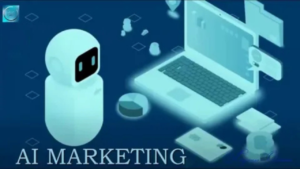Introduction to Digital Marketing Trends

The world of digital marketing keeps evolving, and the new marketing trends are really changing the way businesses relate to their audience. The brands intent on trying to stay competitive in this fast-paced, technology-driven environment need to keep apprised of these changes constantly.
Competitors must face the increasing authority of social media, a new class of AI-powered tools, and continually changing consumer expectations. Whether one is just building up one’s unique content strategy or leveraging the latest innovative platforms, adapting to digital marketing trends could make or break a brand’s success.
Probably the most profound change in recent years has been the infusion of AI in all aspects of digital marketing. From predictive analytics to AI-generated content, it is helping businesses automate their efforts at scale while providing experiences that are increasingly relevant to customers.
Meanwhile, social media continues to rule the roost in the marketing sphere. Platforms like Instagram, TikTok, and LinkedIn are becoming vital conduits for engaging with audiences, building brand awareness, and engendering responses. And with all the innovations coming out, it is paramount that businesses position their marketing strategy at the forefront.The leading edge in this dynamic environment is embracing the newest marketing trends and matching them up to your own unique brand goals. Using emerging technologies and keeping a pulse on consumer behavior, businesses are able to craft powerful campaigns which resonate in today’s digital landscape.
AI and Automation in Marketing
Artificial Intelligence and automation have transformed the way digital marketing works, arming businesses with extremely effective tools to make things easier and faster, while enhancing customer experiences, ultimately leading to better efficiency of the whole marketing process. Due to constant furtherance in AI technology, the integration of the same into your marketing strategies is not an option but a need to survive in the fast-paced digital world.
The most important among all the marketing trends that have come up lately is AI in content creation. With the increase in AI-driven tools, every other thing, from blog posts to social media captions to product descriptions and even video content, is possible without wasting marketers’ precious time and effort. This only helps brands maintain consistency online without necessarily compromising on quality. Moreover, AI parses through multitudinous data to develop more personalized and engaging content, thus making sure it really would appeal to certain target groups.
Another critical role of automation pertains to enhancing marketing efficiency. From running automated email marketing campaigns to AI-driven chatbots on social media platforms, companies are relying on automation to create seamless interactions with customers. AI-powered tools help in personalization of email campaigns, segmentation, and optimizing send times-all to ensure that messages hit the right people at just the right time.
Furthermore, social media platforms are now embracing AI and automation for better engagement of businesses with their audience. AI tools can analyze user behaviour and engage better by letting brands customize their social media content. An example of this would be chatbots answering customer queries in real-time to AI algorithms that suggest content aligning with the interests a user has shown, and boost engagement.
The other domain where AI and automation excel is data analysis. Digital marketing is highly based on data-driven decisions, and AI tools aid that by processing large volumes of data to make out patterns, predict trends, and uncover gold nuggets of insight. These allow marketers to refine their strategy, achieve better resource utilization, and bring better ROI on their campaigns.
Video Marketing Evolution

Video marketing has grown to become one of the strongest means in digital marketing, and its evolution is changing the way businesses are speaking to their audience. As social media and the preferences of users evolve, video content has increased and become central in the marketing strategies across various industries. With improvements in technology and the emergence of mobile-first platforms, video marketing ceases to be an option but becomes a necessity for brands in the competitive market to keep up. The uprise of short-form videos is one of the key digital marketing trends happening over the past years.
Platforms like TikTok, Instagram Reels, and YouTube Shorts have really turned brand-audience communication upside down. These bite-sized videos give brands an opportunity to engage with users quickly and creatively, thus providing an ideal way for one’s brand messaging, product showcase, or value addition through tutorials and entertainment. With reduced attention spans, short-form video content has become increasingly popular in captivating consumer interest and driving engagement. Live streaming is another fast-growing trend in the usage of video marketing. Whether through Facebook, Instagram, YouTube, or newer formats such as LinkedIn Live, live video enables a brand to reach its audience in real time.
This vibrant form of social media marketing empowers businesses to stream product launches, behind-the-scenes content, Q&A sessions, or exclusive events that create urgency and help them connect more authentically with their followers. Live streaming also enables interaction with viewers, driving engagement and building stronger relationships with customers. AI is also making its presence felt in video marketing.
More and more AI-driven tools are being used to enhance video creation by making the task easier and more efficient. Examples of this include automating editing processes using AI, creating personalized videos for select audience segments, or auto-generating video captions in multiple languages to expand reach. By implementing such technological capabilities, businesses can generate high-quality, tailored video content in minimal time, thereby enhancing productivity and efficiency in campaigns.
Another key movement for video marketing involves an increasing emphasis on shoppable videos. As e-commerce functions are increasingly integrated into platforms like Instagram and YouTube, brands can now create videos that allow users to click to buy from the video itself.
Such seamless integration of video content with shopping enhances the customer journey by making it easier for users to discover and purchase products without having to leave the platform.
These features are increasingly supported by social media platforms themselves, turning video marketing into a more direct driver of sales.
Personalization and Customer Experience
Personalization and customer experience are becoming the most vital constituents of digital marketing in today’s world. Since customers have become more intelligent and their demands greater, it becomes obligatory on the part of enterprises to offer experiences that strike a chord with their audience. Marketing trends demonstrate very clearly that customers desire a personalized touch in all their interactions via social media, email campaigns, and websites.
One of the main reasons for this shift includes the rise of AI and data analytics. AI tools gather and analyze customer data that enables a business to create hyper-personalized content, product recommendations, and services.
It helps brands understand consumer preference, behavior, and purchase history to deliver more relevant experiences that lead to much higher engagement and increased sales. A digital marketing strategy of this nature enables the company to remove the one-size-fits-all approach and present messages that are really spoken to the individual. Social media marketing relies on personalization as a core driver for customer engagement.
Platforms such as Facebook, Instagram, and LinkedIn incorporate advanced algorithms into content and advertising displayed according to user behavior and preferences. In turn, brands that can tap into these capabilities create extremely focused social media campaigns, literally speaking with specific audience segments.
By personalizing the content and ads they serve, businesses elicit a deeper connection from their followers, making casual users loyal customers. Customer experience also complements personalization. A seamless, enjoyable, and intuitive experience across all touchpoints—from websites to mobile apps and social media—is critical for keeping customers engaged.Companies that invest in improving the customer experience, whether through intuitive web design, personalized messaging, or responsive customer service, will see increased satisfaction and retention.
AI will be handy in this respect, too, because it can automate a great part of customer interactions through chatbots and provide instant support with personalized recommendations for improving the whole experience. Personalization also involves email marketing. Using customer data, a company is able to create highly targeted emails with personalized subjects, content, and product recommendations.
This will most likely result in opening the email and converting them into customers. According to marketing trends, segmented lists and customized content can really boost their campaign performance versus sending a ‘common’ and nontargeted email. The ultimate results expected of personalization are to make the customer feel valued and understood.
Whether through AI-powered recommendations, customized content, or frictionless experiences across digital marketing channels, businesses that place a strong focus on personalization are better positioned to nurture long-term customer loyalty and drive business growth. With the continuous change in social media and other digital platforms, adopting personalized marketing strategies will continue to be a key differentiator for competitiveness in the ever-changing world of digital marketing.
Sustainability and Ethical Marketing
In the last few years, sustainability and ethical marketing have taken a center stage as the mainstay of digital marketing strategies. With growing socially conscious consumers, the onus is on brands to shape up and be responsible and transparent in their operations. Marketing trends are veering toward this call as businesses make sustainability and ethics part of their marketing strategy in a bid to engender trust, improve brand loyalty, and identify with such ecologically and socially conscious audiences.
Another profound force here is environmental awareness: changes in climate, pollution, and the depletion of resources. Consumers want brands that can be sustainable through their offering of products with ecological compatibility, low carbon footprint, or practice of ethics in labor. Brands that execute this kind of communication well will ultimately provide an emotional connect to their audience and present themselves as responsible leaders in the industry.
Social media is a driver of sustainability and ethical marketing. Instagram, Facebook, and Twitter have become important tools for brands to communicate social responsibility. Sharing behind-the-scenes, sustainability initiatives, and partnerships with eco-conscious organizations can help a brand build credibility and trust within the community of followers. Moreover, social media enables consumers to interact directly with brands: asking questions, sharing feedback, and holding businesses accountable for promises made.
AI and data analytics also help in a more sustainable approach towards marketing. Using AI-powered tools, businesses can analyze consumer behavior and trends, optimizing marketing strategy to deliver more targeted, relevant content. Data would further help brands discover opportunities in waste reduction: from reducing unnecessary packaging to streamlining supply chains. AI can also help brands to evaluate their environmental impact, finding more environmentally sustainable ways to operate, which in turn easily integrates ethical considerations into their digital marketing.
In addition, ethical marketing concerns the promotion of products and services that relate well with a firm’s values. This comprises transparency in sourcing, fair labor practices, and the social impact of product results. Through this practice of aligning marketing communications to ethical values, businesses are capable of distinguishing themselves from competitors and securing potential consumers who esteem integrity and social responsibility.
As digital marketing continues to grow, sustainability and ethics are required in order to ensure success for the longer term. The brands that hold onto sustainability as part of their marketing strategy and communicate their commitment authentically have more opportunities to develop loyalty, gain new customers, and improve their reputation. In today’s digital-first world, it is not only a smart business move but also a reflection of values cared about most by modern consumers to make sure that the marketing trends in social and environmental responsibility are up to par.
Emerging Social Media Trends

Social media remains one of the driving forces behind digital marketing, evolving at a rapid pace into the needs of both consumers and businesses. With new platforms emerging and existing ones adding innovative features, it is necessary to stay up to date with emerging social media trends if a marketer wants to increase his visibility and improve his engagement. In this section, we’ll explore the key trends reshaping social media marketing and how businesses can leverage them to enhance their digital marketing strategy.
1. Rise of Social Commerce
One of the most significant social media trends is the growth of social commerce—the ability to shop directly through social platforms like Instagram, Facebook, and TikTok. With social media becoming more e-commerce-focused, users are now able to discover, browse, and purchase products all in one place. For marketers, this provides a great opportunity to sell products directly to an audience, while offering them a seamless shopping experience. By integrating social media with e-commerce, the purchase process is accelerated and more simplified, resulting in more conversions and increased customer satisfaction.
2. Increased Use of Influencer Marketing
Influencer marketing remains an ever-evolving, yet important strategy through which brands reach new audiences. As the popularity of micro and nano-influencers continues to rise, business entrepreneurs start focusing more on developing relationships with influencers who can boast smaller but highly engaged followings. Influencers at this level tend to command greater trust and authenticity within their communities, making their endorsements that much more powerful. Whether through sponsored posts, product collaborations, or live-streamed events, digital marketing strategies that integrate influencer partnerships build brand awareness, drive sales, and foster loyalty.
3. Short-Form Video Content
The phenomenal growth of platforms like TikTok and Instagram Reels has sealed the potential of short-form video content in the realm of digital marketing. Being short and pint-sized, these videos can be viewed and shared with ease, hence apt for a cluttered social media environment. With this marketing trend, businesses will be able to create content that resonates with users much faster, whether it is a product demo, behind-the-scenes look, or even an entertaining promotional video. Not only does short-form video really help drive engagement, but it does equally well in driving traffic and conversions.
4. AI-Driven Social Media Tools
AI is quickly changing how brands interact with audiences on social media. From chatbots to automated content curation, AI-powered tools are increasing efficiency and personalization in social media marketing. For example, AI algorithms can recommend to users their personalized content that best suits their interests, which enhances user experience and captures engagement. AI is being used in sentiment tracking, performance measurement, and trend forecasting as a way of helping businesses refine their social media strategy and push the most relevant content to their audience.
5. Ephemeral Content
Ephemeral content is temporary posts that vanish after 24 hours. In particular, it has become incredibly popular on Instagram, Snapchat, and Facebook. This marketing trends inspires the need for authenticity and real-time engagement. Because the content is transient, it invites users to act faster, driving high interaction rates. Brands can use ephemeral content to give followers a sneak peek at new products, special offers, or behind-the-scenes moments, creating urgency and exclusivity.
6.Social Media as Content Hubs
As social media continues to evolve, platforms are becoming central hubs for more than just social interaction—they’re increasingly used to find and consume content.
With integrated features including IGTV, Facebook Watch, and YouTube Shorts, social platforms are affording brands increased opportunities to publish long-form and interactive content. Social media marketing now comprises the development of many different types of content, such as articles, videos, podcasts, and infographics, which create value and engage users in a unique way. A good content strategy on these platforms can improve brand visibility and allow businesses to show more intimate connections with their audience.
7. Increased Focus on Privacy and Data Protection
As data privacy concerns continue to increase, social media platforms are implementing new features to better protect user data privacy. See Next Post




